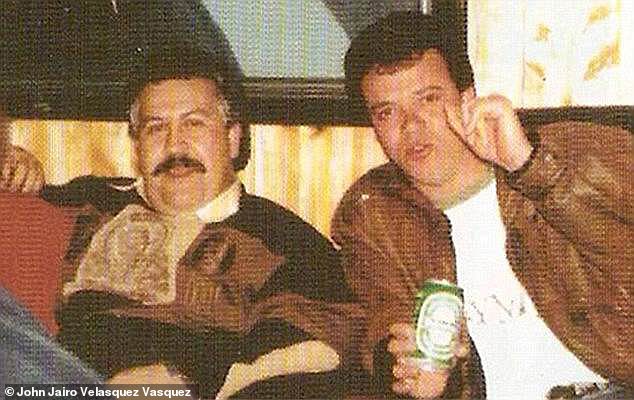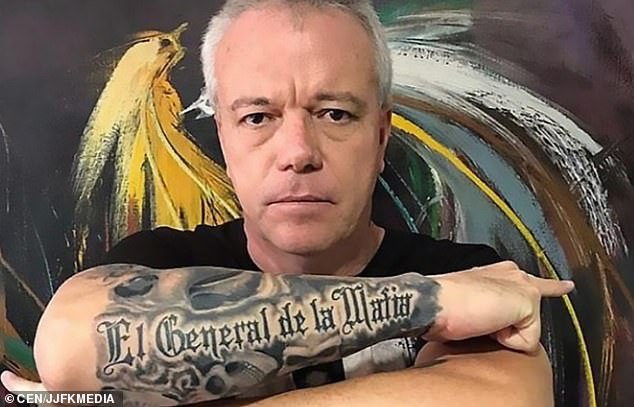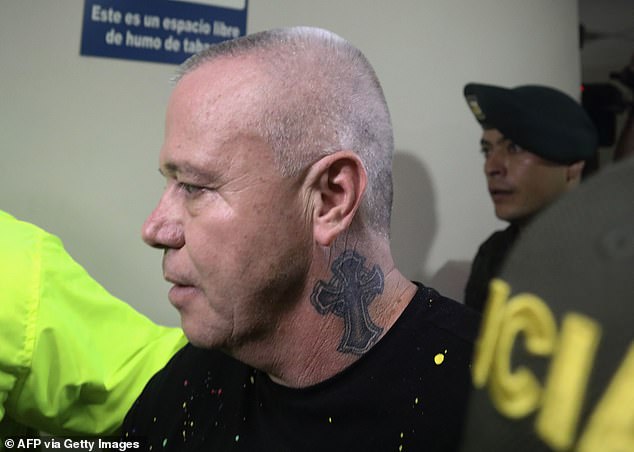
Colombian drug lord Pablo Escobar's former chief hitman Jhon Jairo 'Popeye' Velasquez has died of cancer today at the age of 57.
Velasquez served a life sentence after admitting to killing 300
people and ordering the deaths of 3,000 more as he violently enforced
Escobar's legendary reign of terror.
The heartless assassin - who once described killing as 'like a day at the office' - was jailed in 1993 - the year Escobar was gunned down by police in his home town of Medellin - but was released in 2014.
Velasquez then went into hiding for several years fearing reprisals
from his victim's families and members of the Medellin Cartel he helped
to convict in return for a lighter sentence. He was arrested again in
May 2018 on suspicion of extortion and conspiracy and had been back
behind bars since then.
Colombia's National Penitentiary and Prison Institute (INPEC)
confirmed that Velasquez died in the early hours of the morning in the
National Cancer Institute in the capital Bogota.
He had been diagnosed with cancer of the oesophagus which had
spread to his lungs, liver and other organs and had been hospitalised
since December 31.
The killer had been held at the maximum-security Valledupar prison in the northern Colombian department of Cesar.

Velasquez was the leader of the hitmen of the Medellin Cartel run
by Escobar until his death in 1993 when he was shot dead on a roof top
in his home town in Colombia by a specialist police unit.
Escobar had previously been found guilty of terrorism, drug
trafficking and murder and served time behind bars before escaping and
going on the run.
Velasquez helped plan the homicide of former presidential candidate
Luis Carlos Galan, who was shot to death in 1989, and the bombing of
Avianca Flight 203 which killed 107 people in 1989.
He referred to himself as 'Pablo Escobar's trusted assassin' but
tried to paint himself as a reformed character after his release from
prison in 2014.
He said: 'I'm also a victim of Don Pablo. I was not responsible
for the assassinations. I was a professional killer and nowadays I have
reconsidered it. I am a repented and reformed man.'
As Escobar's head hitman, 'Popeye' executed - either personally or
on his orders - thousands of people deemed to be a threat to his cocaine
trafficking empire, including policemen, journalists, politicians and
judges, while innocent civilians were also inevitably caught up in the
carnage.
After meeting Escobar through a childhood friend when he was 18,
Vasquez's first 'contract' was to kill a bus conductor in Medellin who
had enraged Escobar after he didn't help a friend's mother who fell as
she got off the bus and died.
The cold-hearted killer, who was paid £25,000 for the hit, later said:
'I made some enquiries, found the guy and killed him. I felt nothing.
That idea that a person cannot sleep for thinking about dead people
doesn't apply to me.
'Neither did I need to take drugs, or smoke, or take pills to
calm myself down. The deeds that I have done don't deprive me of sleep.'
In an interview from a mountain hideout in 2015 - where he was in
fear of his life from relatives of his many victims - he insisted all
those he killed were just 'casualties of war'.
He said Escobar - once ranked by Forbes magazine as the world's
seventh-richest man - was far more powerful than anyone had imagined
before he was finally gunned down by US DEA agents after a rooftop
showdown in 1993.
As well as hundreds of other murders, 'Popeye' achieved notoriety
for a string of attacks on well-known members of the Colombian
government.
He kidnapped and tortured a future Colombian president and
vice-presidents, he killed an Attorney General, and helped plot the
murder of Colombian presidential candidate Luis Carlos Galan, the only
murder out of thousands for which he was actually convicted.
By the time he was arrested in 1992, he had killed 250 people with
his own hands - including his own girlfriend - detonated over 250 car
bombs, and was linked to the 1989 bombing of an Avianca jet, which
killed 107 people, just to assassinate one traveller, another
presidential candidate.

In December he told from behind bars how the cartel smuggled the
bomb onboard in the briefcase of an unsuspecting young man who thought
he was merely recording some DEA agent's conversations on board.
As he opened the briefcase the bomb detonated.
He told the Daily Beast from inside prison: 'That briefcase was a work of art.'
But despite having taken so many lives, Vasquez claims he had no
choice but to obey Escobar's orders and feels no guilt for the crimes.
He said in the 2015 interview: 'I'm also a victim of Escobar. I was not responsible for the assassinations.'
Of the plane bombing, Vasquez admitted: 'I took part, but Pablo Escobar planned it.
'I handed over the money to plant the bomb, but I've already paid for that.'
The atrocity failed to kill its target after presidential candidate Cesar Gaviria changed his travel plans at the last minute.
Vasquez claimed the attack, and many others, was only possible
because Colombia's intelligence agency the DAS - provided security to
state institutions, politicians and other figures - was under Escobar's
control.
He said: 'Without the involvement of DAS in the 1980s the
murders of many politicians, as well as drug traffickers who were
enemies of the Medellin Cartel, would not have happened.'
At its peak, the Medellin Cartel supplied 80 per cent of the
worldwide cocaine market and generated at least $420million
(£270million) in weekly revenue.
Escobar's brother once revealed the organisation was making so much
cash that they used to spend £1,200 a month on rubber bands just to
hold it in bundles.
At Escobar's palatial estate, the drug lord lived an extravagant lifestyle.
As well as a private zoo, including a herd of 50 hippos imported
from Africa, he also flew in beauty queens and famous musicians for
entertainment and would reportedly sent helicopters to pick up his
favourite hamburgers.
But outside, his ruthless cocaine monopoly turned his home city
Medellin into a war zone and made Colombia the murder capital of the
world, as the gang mercilessly killed anyone who tried to stop him.
Velasquez was the cartel's 'head of operations' and plotted most of
its high-profile slayings, often in public places and with no concern
for the lives of innocent passers-by.
The group's message to those in power was 'plata o plomo' - silver or lead - which colloquially translates to 'take the bribe or end up dead' .
When, in 1991, Escobar gave himself up after being linked to the
assassination of a presidential candidate, authorities granted his
wishes not to be extradited to the US and even let him build his own
'prison' on the outskirts of Medellin named La Catedral, complete with a
football field, waterfall, Jacuzzi and dolls' house.
His loyal hitman went with him and continued to murder on his behalf as he ran his drugs empire behind bars.
When the under-pressure government announced plans to move Escobar
to a tougher jail, the drug lord simply walked out of the back gate and
vanished.
In fact it was Escobar's failed assassination of Cesar Gaviria in
the aeroplane explosion which proved to be the drug lord's undoing.
The presidential candidate went on to win the 1990 election and
proceeded to launch an anti-drug crusade, which Escobar answered with a
bloody war on the government that ended when the kingpin was killed in a
rooftop gunfight with police in Medellin three years later.
In October 1992, with the noose tightening around Escobar, 'Popeye'
handed himself in and confessed to his 3,000-plus body count.
In jail, he cooperated with the authorities to secure the
conviction of other Medellin members, studied for degrees and acted as a
mentor for younger prisoners, encouraging them not to return to a life
of crime on their release.
After 22 years behind bars, Vasquez walked free in August 2014,
escorted by 200 police in five vans and on 10 motorbikes. At the time he
thought there was 'an 80 per cent chance of me being killed. Twenty per
cent chance of making it.'
Source: Dailymail





















0 comments:
Post a Comment